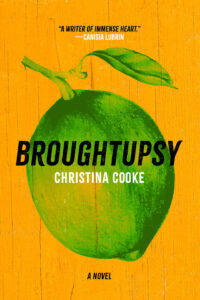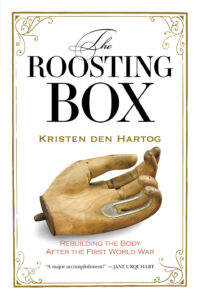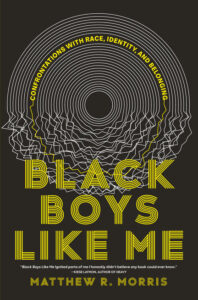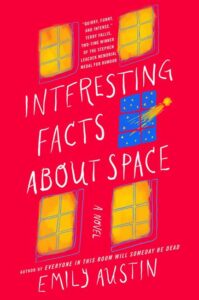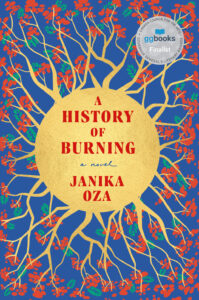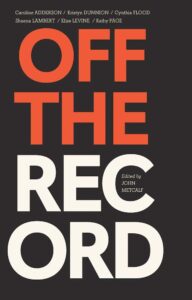March 5, 2024
Broughtupsy, by Christina Cooke
It’s dizzyingly (dazzlingly) disorienting, the narrative of Christina Cooke’s debut novel Broughtupsy, and that’s by design, for it’s protagonist, Akúa, is racked with raw unprocessed grief after the death of her younger brother and the end of her relationship. Never mind that she’s been trying to outrun grief and gathering losses since the death of her mother years before, after which their father moved the family from their home in Kingston, Jamaica, to Texas, and then Vancouver, Akúa’s older sister, Tamika, refusing to come along for the ride. Akúa, only twenty, is so old and so young at once, essential parts of her stopped at the point where her mother died and her family fell apart. She’s not thinking clearly, her choices are impulsive. She’s decided to take out a student line of credit and bring her brother’s ashes back to Jamaica, to face her fierce older sister for the first time in ten years, both sisters bringing so many grievances and resentments that it’s impossible to connect. But the kinetic vibe of Kingston’s streets turn out to be a useful counter to Akúa’s grief and numbness, and Tamika’s own volatility has a similar effect, however complicated. It’s not healthy, but Akúa doesn’t want healthy, instead she desires to push her luck and flirt with danger, indulging herself with sensory experiences, reminders of who she used to be, the fact that she’s alive.
She meets Jayda, a stripper, and can’t help but be drawn to her, to her world, a world so far away from the staunchly devout Tamika and her judgments of Akúa’s sexuality, her relationship with a woman. Tamika insisting this judgment is not simply morality, but also practicality, because it’s different for a gay woman in Jamaica, it’s dangerous… But what does Akúa really have to lose?
The novel entire is the answer to that question, and it’s ending is powerful, moving, and so satisfying cathartic.
February 21, 2024
The Roosting Box: Rebuilding the Body After the First World War, by Kristen den Hartog
Whoever you are, I can likely promise you that The Roosting Box, by Kirsten den Hartog, is not like any book you’ve read before. den Hartog is an award-winning novelist, co-author of two other books of historical nonfiction, and her approach to history in this latest offering is lyrical (lines in italics throughout the book which are embedded in her own prose are actually borrowed from poets who died in World War One, figures she sees as ghosts who haunt the text), whimsical (“In a way it was a magical time,” the book begins, “given that magic can be dark or bright or both at once. Men by the thousands travelled up into the clouds in flying machines. Submarines lurked below the surface of the water and the men inside fired torpedoes at the enemy just like toys come to life. Little figurines full of wishes and nightmares.”) with the most prosaic setting possible (a former cash register factory beside the railway tracks, not far from the tannery with a view from the roof of the Ford Motor Company) that turns out to be the springboard for so many true stories, some heartening, most harrowing, making clear the enormity and inhumanity of what people and other creatures are forced to survive (and/or perish by) in war.
But then den Hartog has a better metaphor (this is why she wrote this book, and I didn’t)—not a springboard, but a roosting box, “a communal space that provides ideal but temporary shelter for [the] vulnerable.” That space is the National Cash Register Factory in Toronto, which by 1918 was converted into the Dominion Orthopaedic Hospital, and would become the Christie Street Veterans Hospital. The book is not a history of the hospital itself per se (though it’s loosely structured around its opening and ends with its replacement by Sunnybrook Hospital in the 1940s, as a new generation of wounded soldiers came home from another war), but instead a collection of stories about the lives of people who graced its halls, patients, doctors, nurses, and more—dietitians and occupational therapists (both new professions for women that emerged at this time), artists and sculptors involved in facial reconstruction, no less than Frederick Banting, whose studies were tested on diabetic patients at Christie Street. “So while the hospital is at the centre of this book, the story travels off from that point in many directions—to battlefields, to small hometowns in Canada and abroad, into makeshift hospitals on the frontlines, and across the ocean on warships. It moves backward and forward in time, always returning to the place (and the concept) of healing.”
War does the most horrifying things to people’s minds and people’s bodies, which den Hartog makes clear in all these stories. She writes about field hospitals and medical boats coming under attack—justifications that the former was build too close to strategic targets and that the latter’s conspicuous red cross was a trick. The images are indelible of nurses’ bodies resurfacing in the water long after, their long blue dresses, and huge white veils. Did you know what being buried alive, even temporarily, does to a person’s digestive tract, let alone their psyche? She writes about the 1918 Influenza Pandemic sweeping the world, aided by the wartime necessity of people in such tight quarters, and how it took down the vulnerable patients at the Christie Street Hospital. Including Indigenous patients, many of whom served as essential snipers at the war front, but would come home again to be denied veteran’s benefits. Patients left mentally shattered by war were also scarcely supported after the fact, it being supposed that anything otherwise would be coddling. The week before the Christie Street Hospital opened, Toronto’s artificial limb workers went on strike, demanding that the industry be helmed by a returned soldier instead of a government bureaucrat. There was an artificial limb industry? I’d had no idea—I was born 60 years after armistice and until reading The Roosting Box, I’d never properly understood how huge the wounded population would have been at the time. I knew that the War Amps nonprofit was a thing, but I’d never thought about why. (Also, the prosthetics weren’t great. Even now, prosthetics can be painful, cumbersome and very expensive, but a century ago, it was sometimes easier to go without.)
A warning: once you pick up this book, you will likely annoy everyone around you by spouting fascinating facts out of context, like a bothersome robot, but pick it up anyway. In The Roosting Box, Kristen den Hartog has brought a piece of Toronto’s history to life, and the effect is pretty dazzling.
February 16, 2024
Good Material, by Dolly Alderton
There’s this weird scene in Dolly Alderton’s second novel Good Material that reminds me of that weird scene in The Great Gatsby where Nick Carraway finds himself between ellipses in a room with a man in bed wearing just his underwear, though in the end it was not like that at all, but maybe the unreliability of the narrator was not so dissimilar, and neither was that this was supposed to be a book about one person (Andy’s ex-girlfriend, Jen) when it was really about the narrator framing the story just so, choosing to see what he wanted to see, and be seen as he wanted to be seen. And that is the end of my The Great Gatsby analogy, and my queer reading of Good Material (though you never know) and maybe the heart of what I’m trying to say is basically along the lines of, there’s a lot going on here.
When middling stand-up comic Andy’s girlfriend of four years ends things between them, he doesn’t seen it coming, but then there’s a lot that Andy doesn’t see, even if he does manage to manipulate his phone to perfectly capture the expanding bald spot at the back of his head. One day he goes through his friend group’s chat history, and notes that he’s only actually listening to his own voice notes, his takeaway from this not that maybe Andy ought to get his head out of his ass, but instead that he really should start a podcast. Let’s just say that Andy’s attempt to get to the bottom of where Jen might be coming from will be so far off the mark, because Andy hasn’t actually comprehended that he’s not the only person in the planet with an interior world.
Over the course of a few months, however, with the aid of some friends, his supportive mom, a job working a cheese stall, as well as an octogenarian housemate with a bomb shelter out in the garden, Andy starts to figure out a thing or two about himself, and others, and being a person in the world. The novel arrives at a satisfying ending, but one that is further complicated by Jen finally giving her side of the story, showing how connected these former lovers actually are, but also the ways into which they’ve always resided in two separate universes.
February 13, 2024
Black Boys Like Me, by Matthew Morris
Three pages into the first essay in Matthew Morris’s new collection BLACK BOYS LIKE ME: CONFRONTATIONS WITH RACE, IDENTITY, AND BELONGING, and I was hooked, as Morris describes a 4am journey through Brooklyn, the way he adapts his performance of self as he passes a police station (“stage my innocence”) versus how he would have acted if he’d run into another Black man on the subway who presents himself in public as Morris does (“I would have amplified my Blackness—for survival”). The former I could have discerned, but I’d never considered the latter—how racism and anti-Blackness could be as pervasive as that.
I loved this book, each essay blowing my mind a bit, framing the familiar in ways that are new to me. How does Morris, as a Black middle-school teacher, get dressed to go to work in the morning, and how are his fashion choices judged in comparison to those of his white colleagues? (What is “professionalism” anyway? What kind of people get to “profess”?) “Still, how are the Jordans I chose to wear to work less professional than the boat shoes Tanner rocked?” He writes about his mom buying him a Snoop Dogg CD when he was nine at the Sunrise Records at Cedarbrae Mall, and what hip hop has meant as a reflection of Black identity when there is so little representation of Black masculinity in pop culture otherwise, but what was complicated about that: “Those rappers were me, but that didn’t mean I was them. Outsiders couldn’t see the difference.” About pursuing his dream of NFL stardom, and the what that pursuit did to his body—he connects the distribution company where his dad worked (and where Morris and his brother worked the summer before he left to play football in Ohio), a company where the workers on the floor were all people of colour, and management was white, to professional sports where white owners reap their fortunes from the bodies of Black athletes. Though the connection is made implicitly, and this is the art in these essays, Morris laying out the evidence and letting the facts speak for themselves.
And herein lies the artistry at work here, in terms of structure, and prose that calls attention to itself in the most vivid and compelling way. I’m going to suggest that that first Snoop Dogg CD was the beginning of an education in the poetics of hip-hop, and that the influence of that poetics is discernible on every page of this book. Although I feel like I’ve never been more middle-aged white lady as when I’m supposing I can discern the influence of hip hop, um, anywhere, but there is just such a rhythm and a feel to Morris’s sentences, their cadences and alliteration. And then I think of the essay “The Fresh Prince Syndrome,” teenage Morris performing Will Smith’s character in school…because the alternative was being Carlton and alienated from his peer group, and I think of the high school teachers who wrote Morris off for being the smartass Black kid mouthing off in the back of the classroom, and is my supposing the influence of hip-hop similar to that, as opposed to a more traditional kind of literary influence? (What is tradition? Who gets to tradish?)
A thread running through all these essays is Morris’s relationship to his family, especially his mother (who was white, with a Polish-Jewish background—interesting to encounter not long after reading James McBride’s memoir THE COLOUR OF WATER), and—more subtly, but essentially—his younger brother, whose trajectory of life as a Black man would be wildly divergent from Morris’s for awhile. While Morris pursues his football scholarship dreams, his brother gets involved with drugs, with drug dealing, and eventually winds up in prison. “Despite thirty years spent knowing and touching and loving each other, we couldn’t be further apart in the routes we’d taken to preserve the collective sense of what Black masculinity meant to us. Of what Black boyhood had meant.”
BLACK BOYS LIKE ME is a complicated work with multitudinous facets, and every one of these surfaces shines. This book is a celebration and a gift.
February 5, 2024
As Long as the Lemon Trees Grow, by Zoulfa Katouh
It is impossible to read As Long as the Lemon Trees Grow—the debut by YA author Zoulfa Katouh, a 2023 CCBC book award-winner, an OLA White Pine nominee, and a finalist for the 2023 Governor’s General Awards—and not think about what’s happening right now in Gaza. Set over a decade ago in the city of Homs, during Syrian Civil War, the novel is about Salama, who—by virtue of having completed a year of pharmacy school—has stepped up to volunteer at a local hospital, removing shrapnel from people’s bodies, performing amputations without anaesthetic, saving whatever lives she can manage to save, which will never be enough, because she can’t save all of them.
Salama welcomes the distraction of her work at the hospital, which at least feels useful, and takes her mind away from not only the existential threat of death by bombs or snipers at any time, but also the figure of Khawf, an embodiment of her PTSD since the death of her mother and her father and brother’s capture by government forces. But she also feels responsible for her pregnant sister-in-law, who is also her oldest friend, and has not forgotten the promise she’d made to her brother to keep Layla safe, and she is trying to secure passage for her and Layla to make the journey across the Mediterranean Sea for asylum in Europe, though the journey is fraught with risk and Salama is ambivalent about leaving Syria behind, and abandoning the revolutionary cause that had inspired uprisings throughout her homeland.
Woven into this story—almost impossibly, and so gorgeously—is a beautiful love story, as well as a brilliant ode to the transportive powers of imagination in general and the works of Hayao Miyazaki specifically, works that have shown how love and magic are possible in the most unlikely places.
And I do not want to gloss over the book’s specificity, in terms of place and story—this novel is a powerful ode to Syrian culture, a love letter to the place itself, and to the possibility of Syrian emigrants one day returning to the freedom that so many have rallied, fought, and died for.
But it is also such an urgent call for the necessity of a ceasefire in Gaza right now, a testament to the suffering through which so many people are living…and dying. A few weeks ago, I read the words of a doctor in Gaza who’d amputated his own child’s leg on his kitchen table, and I just fell to pieces imagining being in such a situation myself: my child, my table. What’s the difference between him and me? What’s the difference between *this*—caring for children who are victims of chemical attacks, patients whose homes have been reduced to rubble, with babies left to die in their incubators because there are not arms enough to carry them all when the hospital has moments to evacuate before the building is bombed—and that one? This novel is a testament to the absurdity of there being any excuse for human beings to have to live this way, for any person to be so dehumanized that such depravity and barbarism is somehow justified. (Our current moment in which migrants are being vilified at border crossings around the world makes Salama’s story doubly, and even more tragically resonant.)
“If we weren’t in such a dire situation, this place would be beautiful. The blackness stretches out in front of us, with the moon casting his silvery glimmer, dimming the light of the stars nearby. It’s the same sky other people see in their countries. But while we watch it here, hiding, not knowing if our next breath is our last, others sleep safely in their beds, bidding the moon a peaceful good night.”
January 29, 2024
Interesting Facts About Space, by Emily Austin
I adored Emily Austin’s debut Everyone in This Room Will Someday Be Dead, which I recall reading during the sad pandemic summer of 2021 and being surprised by its capacity to delight me when not much else was doing the trick, and perhaps it was the mordant dread of its depressive protagonist that did it, her willingness to stare the absurdity of life’s darkness in the face—and be funny and achingly human all the while.
Austin’s sophomore novel, Interesting Facts About Space, is even better, the story of Enid, an information architect who works for the National Space Agency who texts her mother interesting facts about space whenever she worries about her, which is always. Because Enid’s mother has long struggled with her mental health, since Enid’s father left them when she was just a child, and Enid has made herself responsible for her mother’s well-being ever since, a Sisyphean task. Just one of many such tasks in Enid’s life, including finding connection on dating apps, overcoming her inexplicable phobia of bald men, resolving her fears that somebody is watching her and moving things around in her apartment when she’s not there, as well as establishing a relationship with her half-sisters, who she’s only just met since her estranged father’s recent death and who have no idea that she’s a lesbian and might react badly if they did. (She also recorded her entire adolescence on Youtube and lost the password so she can’t take the channel down, or resist watching her younger, naive self over and over again.)
Enid is not well, the impacts of trauma in her past finally catching up with her after years of avoidance, and following her along on this journey (while the narrative voice remains breezy and bright) verges toward agonizing. Except that it never gets there, because of how carefully Austin holds her reader’s heart, all the while it’s threatening to break into pieces. This novel is an emotional roller-coaster, about mothers and daughters, sisters, and lovers, and friendship, and what it means to show up for each other, and also to show up for one’s self.
January 22, 2024
A History of Burning, by Janika Oza
While A History of Burning arrived in my mailbox months ago, it’s taken me some time to finally get to it, because it’s a big book, in terms of scope and word count, and the literary autumn is always overwhelming, and so I’ve been glad for the slowing-down-ness of January and the chance to finally get to dig in to this book that’s garnered so many accolades from writers I admire, plus an honoured spot among finalists for the Governor General’s Literary Award for Fiction.
Spanning almost 100 years, the novel begins with Pirbhai, aged 13 in 1898, tricked into leaving his mother and sisters and boarding a boat for Kenya where he spends the next few years as an indentured worker building a railway for the British. Eventually he marries Sonal, another Indian in Kenya, and together they set off for Uganda in pursuit of a better life, which they achieve, and their son, Vinod, grows up happy and hale. He has dreams of pursuing a university education, but his parents don’t have the means for that, and so he does the best he can with his marriage to Rajni, who doesn’t want to marry a stranger, but Karachi in 1947 is dangerous, and Rajni’s parents feel she’ll be safer in Uganda, so she goes, and the two build a life upon the foundation of Pirbhai and Sonal’s big dreams for life and prosperity, though it’s not long before their world is disrupted by Uganda’s independence, a movement embraced by the Vinod and Rajni’s spirited eldest daughter, Latika. And in 1972, as Asians are expelled from Uganda under the brutal tyranny of Idi Amin, the family loses everything, forced to begin all over again in a new life in Toronto.
The narrative moves between these family members, as well as others, to paint an ambitiously broad picture of this family’s story, the exiles they’re forced into together and apart. And while there were moments I wished the story had drilled down deeper into specific characters’ experiences, the story’s broadness and grand sweep were necessary to show the ways in which the same patterns of loss, heartache and exile recur so many times over a century, the unrelenting violence of colonialism and its echoes. The many ways too in which human beings are able to other their neighbours, regard them as inferior, fall under the spell of autocracy. Such gorgeous writing: “They held their voices low, because they knew: how a dictator’s word becomes the world, how he bends reality before him, how it was not the facts that would determine their lives, but the whispers, the rumours spilling between.”
January 19, 2024
Who’s That Girl?, by Mhairi McFarlane
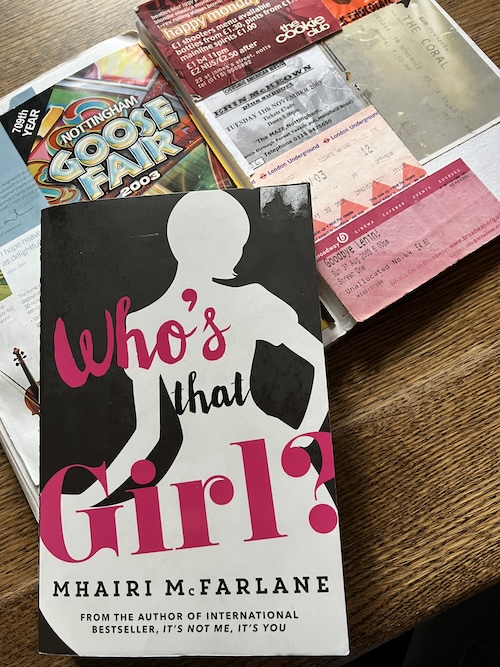
“The Midlands were in-between, just like she was, and the landscape, flat and unassuming, suited her needs. Low and soft, just like a heath, an ideal place for her to land.” —Asking for a Friend
I didn’t know how much it would mean to me to open the pages Mhairi McFarlane’s Who’s That Girl? and be transported back to the city of Nottingham. I haven’t been this excited to be back since I first read Saturday Night, and Sunday Morning, except back then it had only been a handful years since I’d lived there, and now it’s been more than 20. More than 20 years since the last time I walked down Mansfield Road, and then up Sherwood Rise on my way to my little house in Basford. More than 20 years since I’ve been to a Goose Fair, visited the Old Trip to Jerusalem Pub, or contemplated the spiritual distance between West Bridgford and The Meadows. 20 years ago, there wasn’t a burger joint in The Lace Market, but I was so excited when McFarlane’s protagonist, Edie, goes to The Broadway. Her best friend gets divorced and moves into a depressing bachelor pad in Sneinton. She hangs out at the Arboretum. A picnic at Wollaton Hall! I was only disappointed that she doesn’t actually realize her dream of finding ducks to feed on her birthday, because I was very into ducks when I lived in Nottingham, and she wouldn’t have had to search so far to find some.
That, for very personal reasons, I was captivated by this novel about a young woman who slinks into Nottinghamshire with her whole life in shambles (Edie has just attended her work colleagues’ wedding in Harrogate [it becomes Harrogate-gate] and been caught snogging the groom, even though the groom was snogging her, but no matter, she’s on the verge of losing her job as well as her social standing, and her only chance at redemption is coming back to her hometown and ghostwriting the autobiography of a pampered movie star, who is also a Nottingham native) doesn’t mean that this isn’t a story that anyone might enjoy. This is the third novel I’ve read by McFarlane, and I think I love her. She writes romance in which the romance itself takes a backseat to complicated and difficult stories of living through and overcoming trauma, complete with vivid characterization and sparkling humour.
PS A McFarlane has just announced that a sequel to Who’s That Girl? is coming out this year!
January 17, 2024
Off the Record, edited by John Metcalf
I’ve written before about my aversion to self-mythologizing male writers, how much space such hot air takes up in so many rooms, a logical counter, of course, being more women encouraged to see themselves as subjects of grand narratives, to tell their own stories in their own voices, and so enter Off the Record, an anthology of essay-interviews with six writers who’ve worked with editor John Metcalf over the years. Metcalf continuing the editor’s work of self-effacement in this volume, his questions removed from the interviews so just the writers’ voices remain, each interview telling the story of one writer’s becoming, followed by a short story by the writer in question, the fiction as a kind of arrival.
Keep your pencil handy, for this is an underlining, notes (and hearts) in the margins kind of book, with highlights like this from Kristyn Dunnion: “Good writing often embodies a numinous quality, sifting through echoes of other lives lived, connecting clues in an attempt to find meaning: ghost hunting.” Dunnion, along with Elise Levine, two of the writers included here whose work I’m not familiar with, but I appreciated their pieces just as much as those by Caroline Adderson, Cynthia Flood, Shaena Lambert, and Kathy Page, all of whom have written books I’ve loved. The ways in which each of their journeys have been different, but the commonalities too (quite a few backgrounds in activism informing the imagining of fictional worlds). Complicated relationships with parents, publishing journeys that affirm something my friend Marissa Stapley shared not long ago, about a writing career as a marathon, not a sprint, rife with as many downs as ups. The publishing business has always been fraught, and a book deal has never been the end of the story, but maybe we’d be sorry if it was.
From Shena Lambert: “Showing makes our worlds more believable. But this is a secular way of understanding what is actually more like a magical question. In fiction, anytime you press into the five senses, you will write something specific, something, precisely because of its singularity, which will begin the strange work of making meaning. Things of the earth want to be doors into something greater.”
THINGS OF THE EARTH WANT TO BE DOORS INTO SOMETHING GREATER. I don’t know a better explanation of fiction-making, which is to say meaning making, than that.
January 11, 2024
Penelope Mortimer: About Time (Too)
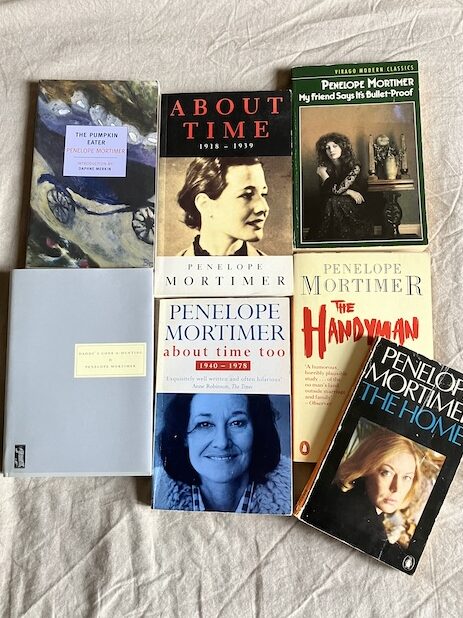
“Of all the Penelopes, Mortimer is my favourite,” I wrote in 2018, though I don’t think I’ve read her since then, and need to refresh my memory, especially now that I’ve just read her two memoirs, ABOUT TIME and ABOUT TIME, TOO. Penelope Mortimer is a standout in my library for being the only author whose books I own in editions from Virago Modern Classics, Persephone AND NYRB (plus two regular old orange-spined Penguins, even though THE HANDYMAN has fallen to pieces). I first learned about her from Carol Shields’ and Blanche Howard’s collected letters, in which they raved about THE HOME, which I loved so much. I actually have no recollection of reading DADDY’S GONE A_HUNTING, a 1958 novel about a mother procuring an abortion for her daughter. I took THE PUMPKIN-EATER, perhaps her best-known book, on a beach side holiday about ten years ago and found it wholly unsatisfying for the occasion, but I think I will appreciate it better now having read its author’s memoirs, for this novel—like all of her novels—was borne of her experience, and that context might just be essential.
In ABOUT TIME, TOO, she writes about looking back on her childhood as a kind of Eden, though it doesn’t read like that me in her first memoir, instead a middle-class English experience of sexual abuse and emotional deprivation, but she recounts it all so jollily that one might just be convinced. The second paragraph of ABOUT TIME begins, “Fortunately I know nothing about my ancestors, and see no particular reason to find out,” and I actually LOVE that, but it’s also emblematic of Mortimer’s refusal to engage with the heart of things, even if such refusal is why the memoir is a pleasure to encounter. The pain in ABOUT TIME, TOO is much more visceral, immediate (a lot of the book is taken from Mortimer’s journals), mostly surrounding the breakdown of her marriage to playwright John Mortimer, her second husband. In between the two husbands, she had two children with two more different fathers, having six children in total, and between the lines one might read some regret about how her children might have suffered by their parents’ unconventional choices, but not too much, and I admire the way Mortimer never apologizes for her sexual appetites, or for her creative impulses, her need to be writing and creating. “The only way to love it all is to cling to it too fiercely. I don’t want to let anything else, anyone else, in. My comfort is the idea of writing this novel. My aim is to keep alive.”
